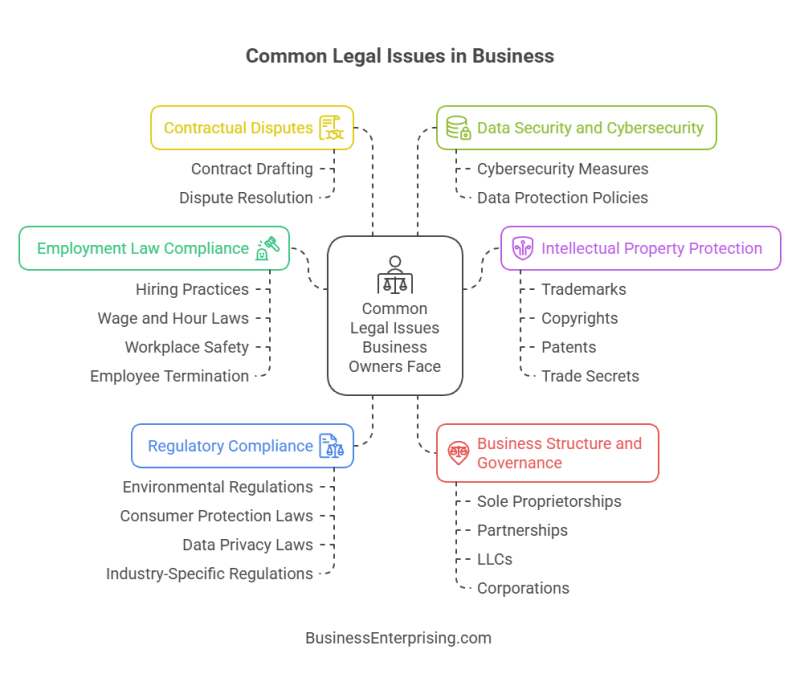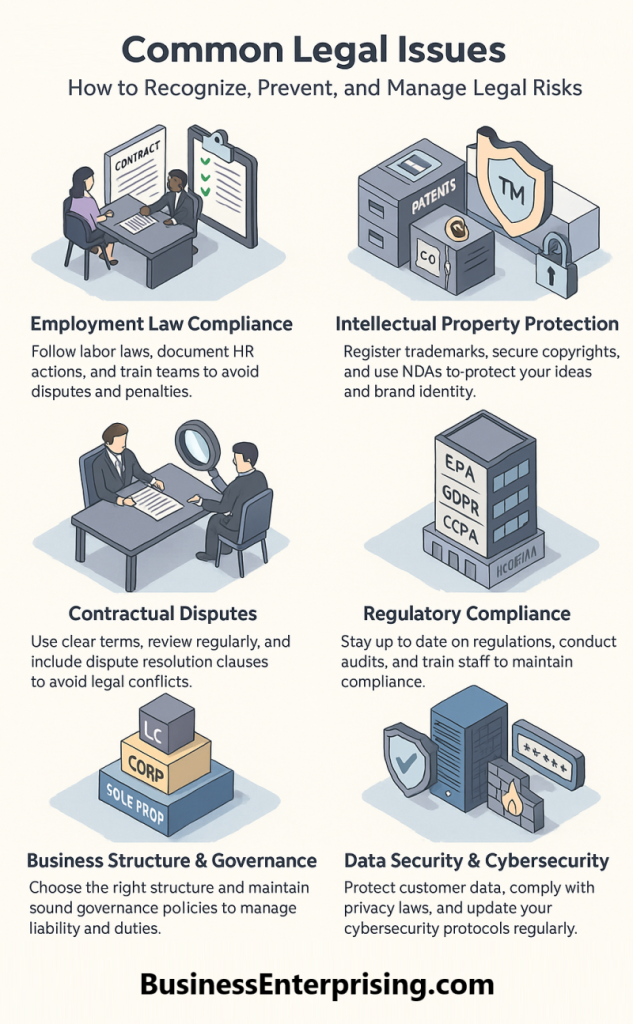 Running a business involves a myriad of responsibilities and challenges. Among these, navigating legal issues is one of the most critical yet complex aspects. Legal challenges can arise at any stage of business operations and can significantly impact a company’s success and longevity. Understanding the common legal issues business owners face is crucial for preventing costly disputes and ensuring compliance. Below are some of the most prevalent legal challenges and offers insights into how business owners can effectively address them.
Running a business involves a myriad of responsibilities and challenges. Among these, navigating legal issues is one of the most critical yet complex aspects. Legal challenges can arise at any stage of business operations and can significantly impact a company’s success and longevity. Understanding the common legal issues business owners face is crucial for preventing costly disputes and ensuring compliance. Below are some of the most prevalent legal challenges and offers insights into how business owners can effectively address them.
Employment Law Compliance
Employment law is a critical area where businesses often encounter common legal issues. Ensuring compliance with labor laws and regulations is essential for avoiding disputes and maintaining a positive workplace environment. Key aspects of employment law include hiring practices, wage and hour laws, workplace safety, and employee termination. Businesses must adhere to anti-discrimination laws during the hiring process. This is to ensure that all candidates are treated fairly regardless of their race, gender, age, or other protected characteristics. Additionally, it is essential to comply with wage and hour laws, including minimum wage requirements, overtime pay, and record-keeping obligations.
Workplace safety regulations, mostly enforced by OSHA, require businesses to provide a safe working environment for employees. Non-compliance can result in significant fines and legal consequences. Furthermore, handling employee termination requires careful consideration to avoid wrongful termination claims. Providing clear documentation and following established procedures can help mitigate the risk of legal disputes in this area.
Intellectual Property Protection
Intellectual property (IP) is another critical area where business owners must exercise caution. Protecting IP is vital for safeguarding a company’s innovations, branding, and competitive advantage. Common forms of intellectual property include trademarks, copyrights, patents, and trade secrets. Trademarks protect brand names, logos, and slogans, ensuring that competitors cannot use similar identifiers that could confuse consumers. Copyrights protect original works of authorship, such as literary, musical, and artistic creations. Patents provide exclusive rights to inventors for their inventions. This is to prevent others from making, using, or selling the patented technology without permission.
Trade secrets, which include confidential business information like formulas, processes, and customer lists, are also crucial for maintaining a competitive edge. Businesses must take proactive steps to protect their intellectual property, such as registering trademarks and patents, using non-disclosure agreements (NDAs), and implementing robust security measures to safeguard trade secrets.
Contractual Disputes
Contracts are fundamental to business operations, governing relationships with employees, customers, suppliers, and other stakeholders. However, contractual disputes are a common legal issue that can arise when parties disagree over the terms or performance of an agreement. To minimize the risk of disputes, businesses should ensure that all contracts are clearly drafted, outlining the rights and obligations of each party. Key elements of a well-drafted contract include the scope of work, payment terms, deadlines, and dispute resolution mechanisms.
Including a dispute resolution clause in contracts can help manage conflicts more efficiently. Alternative dispute resolution (ADR) methods, such as mediation and arbitration, offer a less adversarial and often more cost-effective means of resolving disputes compared to litigation. Regularly reviewing and updating contracts to reflect changes in business practices and legal requirements can also help prevent potential disputes.
Regulatory Compliance
Businesses must navigate a complex web of regulations at the federal, state, and local levels. Regulatory compliance is essential for avoiding common legal issues and maintaining a positive reputation. Key areas of regulatory compliance include environmental regulations, consumer protection laws, data privacy laws, and industry-specific regulations. Environmental regulations, enforced by agencies like the Environmental Protection Agency (EPA), require businesses to minimize their environmental impact and comply with waste disposal, emissions, and pollution control standards.
Consumer protection laws aim to ensure that businesses operate fairly and transparently, protecting consumers from deceptive practices and ensuring product safety. Data privacy laws, such as the General Data Protection Regulation (GDPR) and the California Consumer Privacy Act (CCPA), impose strict requirements on how businesses collect, store, and use personal data. Industry-specific regulations, which vary depending on the sector, may include licensing requirements, health and safety standards, and financial reporting obligations.
Staying informed about regulatory changes and implementing compliance programs can help businesses avoid legal issues and maintain compliance. Regular training for employees and conducting compliance audits are also effective strategies for ensuring adherence to regulatory requirements.
Business Structure and Governance
Choosing the right business structure is a critical decision that can have significant legal and financial implications. Common business structures include sole proprietorships, partnerships, limited liability companies (LLCs), and corporations. Each structure has its own legal requirements, tax implications, and liability considerations. For instance, sole proprietorships and partnerships offer simplicity and direct control but expose owners to personal liability for business debts. LLCs and corporations, on the other hand, provide limited liability protection but require more complex governance and compliance procedures.
Corporate governance involves establishing policies and procedures that guide the management and operation of a business. This includes defining roles and responsibilities, ensuring transparency, and protecting the interests of stakeholders. Effective corporate governance can help prevent legal issues related to conflicts of interest, fiduciary duties, and shareholder disputes. Regularly reviewing and updating governance policies can ensure that they remain relevant and effective in addressing the evolving needs of the business.
Data Security and Cybersecurity
In an increasingly digital world, data security and cybersecurity have become paramount concerns for businesses. Protecting sensitive data from cyber threats and ensuring compliance with data protection laws are critical for avoiding legal and reputational risks. Data breaches can result in significant financial losses, regulatory penalties, and damage to customer trust. Implementing robust cybersecurity measures, such as encryption, firewalls, and multi-factor authentication, can help protect against cyberattacks.
Additionally, businesses must develop and implement data protection policies that comply with relevant laws and regulations. This includes obtaining consent for data collection, ensuring data accuracy, and providing individuals with the right to access and delete their data. Regularly conducting security assessments and updating cybersecurity protocols can help businesses stay ahead of emerging threats and maintain compliance with data protection laws.
Conclusion
Navigating legal issues is an inherent part of running a business, but proactive measures can help mitigate risks and ensure compliance. By understanding the common legal challenges related to employment law, intellectual property, contracts, regulatory compliance, business structure, and data security, business owners can better protect their interests and maintain a stable, compliant operation. Implementing comprehensive legal strategies, staying informed about regulatory changes, and seeking professional legal advice when needed can further enhance a business’s ability to address legal issues effectively.
In conclusion, while these common legal issues are inevitable, being prepared and proactive can make a significant difference in how a business navigates these complexities. By prioritizing legal compliance and risk management, businesses can create a strong foundation for long-term success and sustainability. As the legal landscape continues to evolve, staying informed and adaptable will remain key to effectively managing legal issues and safeguarding the future of the business.


